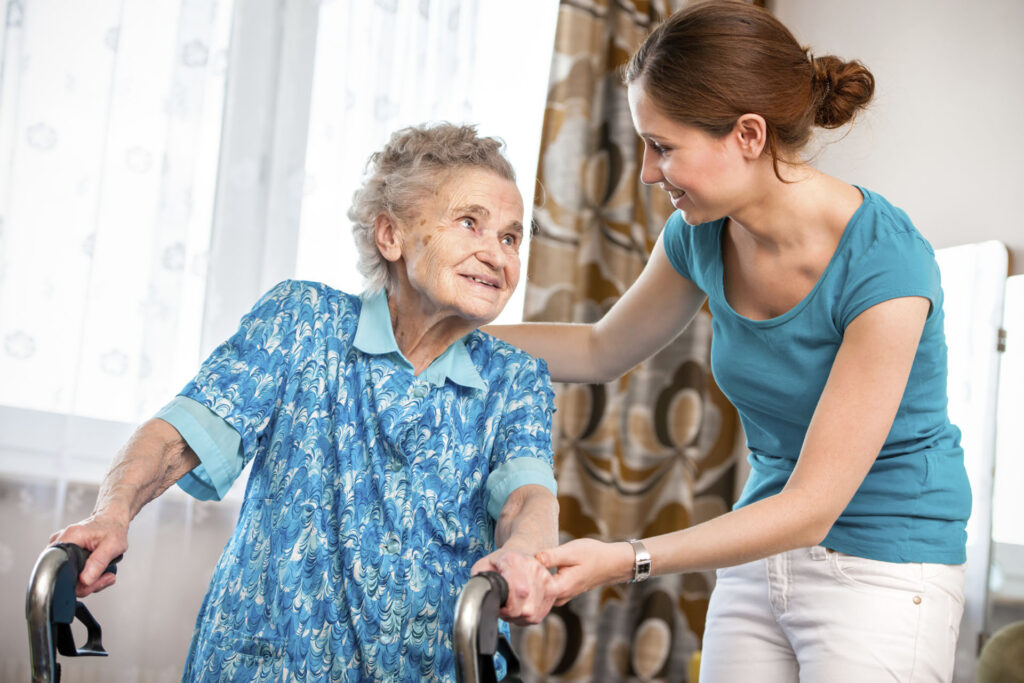What Is Sundowning
Sundowning, sometimes referred to as sundown syndrome, is a term used to describe a set of changes in behaviour that individuals living with dementia experience during the early evening or dusk. These behaviours include:
- Restlessness
- Irritability
- Confusion
- Agitation
- Anxiety
- Pacing and disorientation
Individuals living with dementia, most commonly Alzheimer’s disease, tend to experience sundowning.
This can be distressing for the individual experiencing it and their caregivers. So, it’s essential to understand sundowning, its causes and action steps to help ease the symptoms.
Causes of Sundowning
Medical professionals can’t underline one specific cause for sundowning. Multiple hypotheses point to changes in the brain that affect the “body clock”; however, nothing has been officially confirmed.
Multiple things might also be linked to causing sundowning, including:

- Lack of sun exposure during the day
- Sensory challenges (including hearing or sight loss)
- Overstimulation during the day caused by crowded or noisy environments
- Not getting quality sleep during the night before
- Influence from anxiety or depression
- Exhaustion, hunger, or pain caused by another condition
- Side effects of medications
- Sleep disorders
It’s important to note that individuals experiencing dementia commonly experience sundowning even when the causes listed above are absent. This occurrence is part of the middle to end stages of dementia, and with proper care and support, it can be managed more easily.
Early Signs
It’s always good for caregivers or family members to be aware when an individual shows early signs of sundowning. This can help the carers better prepare to handle and cope with the condition.
Some early signs that usually occur before individuals start experiencing sundowning include:
Confusion or disorientation – the individual might become visibly confused or disoriented during the afternoon or late evening.
Agitation – people with Alzheimer’s or other types of dementia might become agitated, restless, or anxious during the late afternoon or evening. Additionally, people experiencing sundowning tend to pace back and forth aimlessly during these times of the day.
Mood changes – the caregiver might notice sudden changes in mood and signs of anxiety or melancholy during the evening or late afternoon hours.
Challenges with communication – individuals experiencing sundowning might need help to communicate or become less responsive than usual.
Physical symptoms – individuals might experience some physical symptoms, such as pain and discomfort, at any time of day.
It’s essential to mention that not everyone with Alzheimer’s disease or any other type of dementia will experience these symptoms. It’s crucial to remember that all individuals are unique and require tailored support based on their needs.
However, if a loved one is experiencing some of these symptoms after they’ve been diagnosed with dementia, it’s best to seek support.
How Long Does Sundowning Last in Dementia
Individuals start experiencing sundowning in the late or mid-stage of dementia. Not everyone will experience sundowning; however, according to the Alzheimer’s Association, around 20% of individuals with AD experience it at some point.
Additionally, once sundowning episodes start, they could potentially continue to happen more frequently.
The sundowning episode can last anywhere between a couple of hours and all night. When these episodes last throughout the night, it can be immensely difficult for both the individual and the caregiver.
At Leaf Complex Care, we understand the challenges of caring for a loved one going through this experience, and we understand that looking over a loved one 24/7 isn’t possible. However, our clinicians can provide 24/7 support to individuals experiencing sundowning and provide the needed assistance.
Sundowning vs Delirium
Delirium happens when confusion appears suddenly and comes and goes over several hours or days. Sundowning and delirium can easily be confused with one another; however, they are two different conditions.
The main difference is that delirium occurs during any part of the day, while sundowning occurs during the early evening or afternoon hours.
Alzheimer's and Sundowning
Sundowning is most common in individuals who live with Alzheimer’s disease. The link between the two is thought to be because of the individual’s circadian rhythm. It’s important to note that the circadian rhythm impacts people’s moods and is connected to the “body clock”. Hence, sundowning is linked to emotional disruption as well.
In any case, it’s quite common for individuals with Alzheimer’s to experience sundowning. So, caregivers should prepare to face the restlessness, confusion, and agitation their loved ones might experience. Additionally, some strategies can help ease the symptoms of sundown syndrome. This includes incorporating a daily routine, providing a relaxing environment for the individuals, and minimising disturbing stimuli.
With enough effort, support, and patience, those living with Alzheimer’s disease and sundowning can maintain a quality life.
Coping With Sundowning
Sundowning can pose a challenge for both the person experiencing it and their family members or caregivers.
It can be a confusing and challenging experience that might make them anxious or agitated. Similarly, family members might not always know how to approach some symptoms or make them feel more comfortable.
One way individuals and family members can cope with sundowning is by seeking assistance from a professional service. Families can benefit from social workers who are knowledgeable about creating comfortable environments and learn coping tips from them. Home care services provide quality caregivers specialising in sundowning care and can easily handle their symptoms and behaviours.
How to Help Someone Who Is Sundowning?
At Leaf Complex Care, we understand the challenges of caring for a loved one experiencing sundowning.
Our dedicated caregivers provide care and support that meets the unique needs of each individual and their family. We believe everyone deserves a personalised and tailored plan to ensure a comfortable and quality life while experiencing the condition.
What’s more, we provide 24/7 support, including waking night care for when sundowning affects the sleep schedule of your loved one. You can contact our offices in Bristol, Slough, Somerset, and the Midlands.
Contact us today and learn how we can help.


















